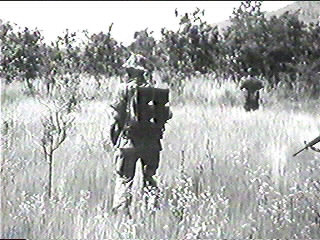One of the more interesting superstitions of Vietnam is the belief in the
wandering soul. It is the Vietnamese belief that the dead must be buried in their
homeland, or their soul will wander aimlessly in pain and suffering. Vietnamese feel that
if a person is improperly buried, then their soul wanders constantly. They can sometimes
be contacted on the anniversary of their death and near where they died. Vietnamese honor
these dead souls on a holiday when they return to the site where they passed away.
Tradition has it that the young Vietnamese boy Kien Muc Lien reached
enlightenment at an early age. His mother was not so lucky. She was evil, and upon her
death, she was sentenced to spend eternity being tormented by demons and ghosts and in
constant pain from hunger. Kien Muc Lien magically sent food to his mother. The demons
were enraged and turned it into flames before she could eat. The son then asked Buddha to
help him care for his mother. Buddha told him to hold a special ceremony. The boy held the
ceremony, called "Lu Van" (Wandering Soul) to pray for his mother’s soul;
and ask that her sins be pardoned. His wishes were granted.
Vu Lan Day is absolution of the soul. This is especially true in the case of
parents. It allows their wandering souls to return home safely. The Vietnamese celebrate
this holiday with many ceremonies including the floating of lights down the rivers at
night to guide the lost souls to Nirvana.
It is held on the 15th day of the seventh lunar month every year at the Hoi An
pagodas. The holiday is so popular than many tourists visit Vietnam during this time of
the year to see the ceremonies. They set aside a day for the wandering souls and offer
food for deceased relatives whom they believe might wander into the homes of their
offspring.
Ann Crawford says in Customs and Culture of Vietnam, Charles E. Tuttle,
Rutland, Vt., 1966: "Wandering Souls' Day is the second largest festival of the year.
(Tet is the first.) Though it falls on the 15th day of the seventh month, it may be
celebrated at any convenient time during the latter half of the month. It is not just a
Buddhist holiday but also celebrated by all Vietnamese who believe in the existence of
God, good and evil. They believe that sinful souls can be absolved of their punishment and
delivered from hell through prayers said by the living on the first and 15th of every
month. Wandering Soul's Day, however, is believed to be the best time for priests and
relatives to secure general amnesty for all souls. On this day, the gates of hell are said
to open at sunset and the souls fly out unclothed and hungry. Thus plenty of food is left
at family altars."
This belief in the Wandering Soul is a strong one and even today, we find news
stories about it. The following was written by Mark McDonald and was published by the Mercury
News Vietnam Bureau under the title of "Remains of the War" in 2000.
"The death certificate has been typed onto thin brown paper, with thick
carbon-paper keystrokes. The document is creased and smudged from three decades of folding
and weeping, but this much remains clear: Le Duy Hien, age 26, was killed on May 5, 1968.
Hien is one of some 300,000 North Vietnamese and Viet Cong soldiers still missing in
action from what is known here as the American War.
In marked contrast to the U.S. effort, the search for Vietnamese MIAs has
largely been left to the families of the missing. Even now, 25 years after the end of the
war, their relatives can be seen all over Vietnam, mostly on weekends, trudging forlornly
through the sprawling military cemeteries reserved for the liet si -- the martyred. They
go from headstone to headstone, pausing briefly at each one, looking for the name of a
lost son, a dead husband, a missing brother.
‘Strangers have buried you in careless haste, no loved ones near, no
friend, no proper rites . . . and under the wan moon, no kindly smoke of incense wreathes
for you,’ the Vietnamese poet Nguyen Du wrote in his elegy, ‘A Call to Wandering
Souls.’
To reach out to Le Duy Hien's wandering soul, the family holds a somber
memorial ceremony every May 5 -- the date on his official death certificate. However, the
family has been unable to follow the Vietnamese custom of digging up his bones after three
years for cleaning and re-burial, and it causes Hien's mother no small amount of grief
that her son's soul is still at large.
‘She believes Hien is not at rest,'' says Le The Luan, Hien's younger
brother, who is now 54. ``Like all Vietnamese families, she wants to have us find his
remains so he can be stable and at peace.’
The biggest problem for Hien's family is right there on his faded death
certificate: On the dotted line that states where the young North Vietnamese sergeant went
down, it only says, `’On a battlefield in the south.’
Sadly, Hien's family has no clues to his possible whereabouts. They know he
headed off down the Ho Chi Minh Trail after being drafted, but he wrote the family just
one letter, a letter that gave no details about his unit, its location or ultimate
destination.
Therefore, Le Duy Hien's body remains undiscovered -- and his soul remains at
large. His mother receives a small monthly payment from the government because, under
Vietnamese law, all MIAs from the American War are now considered dead. The money,
however, barely covers the cost of the incense she burns for him every day.
The Vietnamese are great poets and there are many poems that honor these
wandering souls. One was written by Linh Duy Vo. It is entitled "The Wings of
Freedom" and is dedicated to the South Vietnamese Freedom Fighters. Part of the poem
is:
Four thousand years, countless perils
The blessed South Vietnam still exists
But your broken wings hurriedly bid farewell
You perished without whispers...
Gray clouds sadly enveloped your wandering soul
Dark oceans mourningly embraced your wings.…
During the American involvement in Vietnam, an attempt was made to use this
belief against the North Vietnamese and Viet Cong. Since it was clear that they would die
far from home, their bodies probably never found or never properly buried, it was certain
that they would become a wandering soul after death.
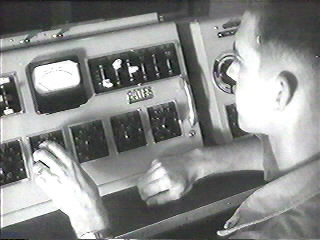
Editing the recording
The operation was code-named "Wandering Soul." Engineers spent weeks
recording eerie sounds. They were similar to the sounds employed during a scary radio show
or movie. Very creepy and designed to send shivers down the back. These cries and wails
were intended to represent souls of the enemy dead who had failed to find the peace of a
proper burial. The wailing soul cannot be put to rest until this proper burial takes
place. The purpose of these sounds was to panic and disrupt the enemy and cause him to
flee his position. Helicopters were used to broadcast Vietnamese voices pretending to be
from beyond the grave. They called on their "descendents" in the Vietcong to
defect, to cease fighting. This campaign played the sounds and messages all night in order
to spook the superstitious enemy. Despite eventually realizing that they were hearing a
recording beamed from a helicopter, the enemy gunners could not help but fear that their
souls would some day end up moaning and wailing in a similar fashion after death.
The messages were broadcast by both the 6th PSYOP Battalion of the
United States Army and some units of the United States Navy. In general, the messages were
as follows:
Girl's voice:
Daddy, daddy, come home with me, come home. Daddy! Daddy!
Man's voice:
Ha! (his daughter's name). Who is that? Who is calling me? Oh, my
daughter? My wife? Daddy is back home with you, my daughter! I am back home with you, my
wife. But my body is gone. I am dead, my family.
I…..Tragic, how tragic.
My friends, I come back to let you know that I am dead! I am dead! It's
Hell, Hell! It is a senseless death! How senseless! Senseless! But when I realized the
truth, it was too late. Too late. Friends, while you are still alive, there is still a
chance you will be reunited with your love ones. Do you hear what I say? Go home! Go home,
my friends! Hurry! Hurry! If not, you will end up like me. Go home my friends before it is
too late. Go home! Go home my friends!
One wartime news story tells of the operation at Fire Support Base (FSB)
Chamberlain. It was published in Tropic Lightning News, 23 February 1970.
"If you were a Wolfhound of the First Battalion, 27th Infantry, 25th
Infantry Division, and were at Fire Support Base Chamberlain on the night of February 10
you might have sworn the place was being haunted by poltergeists, ghosts that is.
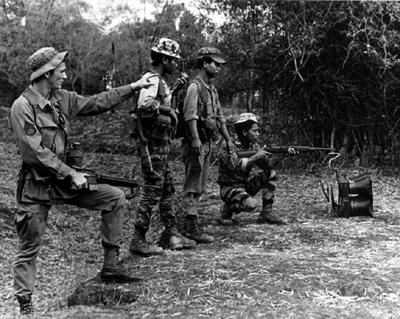
Loudspeaker Team
The moans, groans and weird sounds began at eight that night, a likely time for
the cloudlike forms to reveal themselves. Of course, ghosts are nonexistent, or are they?
In this case the ghosts and weird sounds were furnished by the Sixth PSYOP Team and the
S-5 Section of the 1/27th Wolfhounds who were conducting a night mission at Chamberlain.
With the help of loud speakers and a tape of ‘The Wandering Soul,’ a mythical
tale of a Viet Cong gone to Buddha, the mission was a success.
’The Wandering Soul is a tape about the soul of a dead Viet Cong. It
describes the wandering of this soul about the countryside. The dead VC tells his comrades
to look at what has happened to his soul and that he will never be at rest, always
wandering,’ said Captain William Goodman of Philadelphia, the battalion S-5.
‘Buddhists believe very strongly that if they aren’t properly buried and
properly mourned, their soul will wander through eternity,’ added First Lieutenant
Peter Boni of Boston, the officer in charge of the Sixth PSYOP Team. ‘We play upon
the psychological superstitions and fears of the enemy.
The method is very effective,’ Boni said.
‘The tape makes the friendly villagers return to their homes, and any
suspecting persons who remain are questioned,’ Goodman said. A quick-reaction sweep
following the tape by the l/27th Recon Platoon netted three detainees, one of whom was
jailed. ‘It was the first time this type of tape has been used in the Third Brigade
and reviewing the results we plan to use this method again,’ Boni said."
Sometimes the Wandering Soul tape was used in conjunction with other sounds to
multiply the fear in the heart of the enemy. A former member of the 6th PSYOP Battalion
told me, "You know what we did on 'Nui Ba Den Mountain' in 1970? The 6th PSYOP got an
Air Force pilot to fly to Bangkok, to get an actual recording of a tiger from their zoo.
We had a Chieu Hoi (rallier to the national government from enemy ranks) come down the
mountain and tell of a tiger that was attacking the Viet Cong for the past few weeks. So,
we mixed the tiger roar onto a tape of 69-T, 'the wandering soul', and a 2-man team got up
on the mountain, played the tape and 150 Viet Cong came off that mountain.
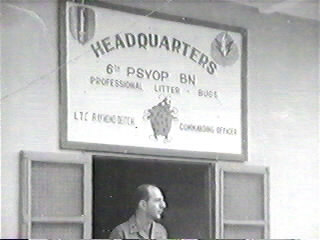
LTC Raymond Deitch, 6th PSYOP Battalion Commander
Raymond Deitch, former commander of the U.S. Army 6th PSYOP Battalion was
interviewed on the History Channel Secrets of War series, episode 51,
Psychological Warfare. Talking about Operation Wandering Soul he said, "It
exploited the belief among many of the Vietnamese people that once a person is dead the
remains must be placed in an ancestral burial ground or that person will forever wander
aimlessly in space forever.
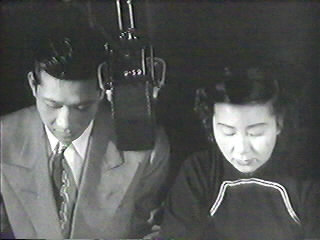
South Vietnamese Nationals make a recording
A male voice was recorded through an echo chamber that represented the soul of
the dead soldier. In some cases, the recording was actually too persuasive for its own
good. The tape was so effective that we were instructed not to play it within earshot of
the South Vietnamese forces, because they were as susceptible as the Viet Cong or North
Vietnamese Army."
The PSYOP-POLWAR Newsletter of 20 November 1969 mentioned the Wandering
Soul campaign briefly, "The First Infantry's Divisions G-5 staff used 'Wandering
Soul' broadcasts of eerie sounds intended to represent the souls of enemy dead who have
not found peace (i.e. by being buried in the village family plot). Communist troops, of
course, knew perfectly well that the sounds were coming from a tape recorder on an enemy
helicopter, but the idea was that the sounds would at least get a Communist soldier to
think about where his soul would rest in the likely event of his being killed far from
home."
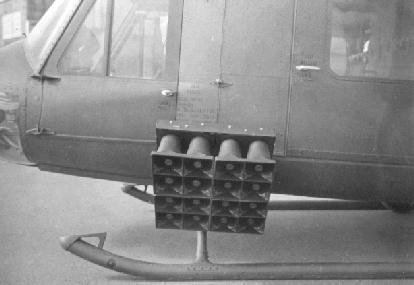
Huey Helicopter with mounted loudspeakers
Duane Yeager mentioned the operation is an article entitled "Winning
Vietnamese minds was what the U.S. Army's 4th Psychological Operations Group was all
about," in Vietnam Magazine, December 1990. He says:
As with the leaflet catalog, PSYOP units also produced and maintained a library of
audiotape propaganda messages for support of tactical operations. As one Viet Cong
commander complained, these audio messages were hard to ignore, for the sound even
penetrated through the earth to VC hidden in underground tunnels. One of the most
effective such tapes was 'The Wandering Soul,' an eerie tape, played mostly at night, that
constantly reminded NVA soldiers of the hardships they were enduring, home, and the loved
ones they had left behind.
Robert H. Stoner reports a Navy operation. He tells of Operation Sea Float/Solid
Anchor. This was a joint US-Vietnamese attempt to inject an allied presence into An Xuyen
Province, 175 miles southwest of Saigon. Stoner says:
This evening's adventure was to insert and extract a Beach Jumper Unit ‘Duffel Bag Team.’
(This team planted and monitored vibration-and body heat-activated sensors that helped track movements of the bad guys
around our base). On the way out, we were to play some ‘Wandering Soul’
tapes the Psychological Warfare boys had dreamed up to terrorize the guerillas. The line
was the guerillas would become so frightened, they'd come over to the government
side."
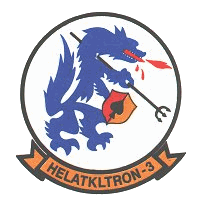
HAL-3 Seawolves
Aviation Electricians Mate Senior Chief (E8) Bill Rutledge took part in a Navy
operation using Army helicopters temporarily surplus from the Army inventory. He says:
The only Navy Helicopter Gunships that ever flew combat missions were assigned to
Helicopter Attack (Light) Squadron Three (HAL-3)(the Seawolves), under the operational
control of Commander, Task Force (CTF) 116, in Vietnam from 1966-1972. This unit was the
most decorated naval aviation unit in history. Navy pilots and enlisted gunners flew
heavily armed Army UH1B "Huey" Gunships at low level and in the night covering
the Navy Seals, The Brown Water Riverine Forces, and any allied unit in contact with enemy
Viet Cong and regular North Vietnamese Army forces. They supported the PBR (Patrol Boat,
River) operations with fire support, recon, and medevac services. The unit was tasked with
additional responsibilities, including assistance to the Vietnamese Navy units operating
in the Mekong Delta.
The Saigon Brass came up with an added mission. We were already dropping Chieu Hoi
passes, small Republic of Vietnam Flags and surrender pamphlets during our regular
missions. In addition, we were now to place one large speaker in each back door of the
Gunship to play a PSYOP Cassette repeating tape while flying over known enemy controlled
areas. Invariably, playing of the tape to win the "hearts and minds" of the
enemy forces would cause the enemy forces to fire on the helicopter. With the large
speakers in the door, it was difficult for the door gunners to return fire. The
Saigon-issued mission orders put the aircrews at great risk. We were not there to win
hearts and minds. We were there to protect allied forces on the ground and to search for,
and destroy any enemy we could find.
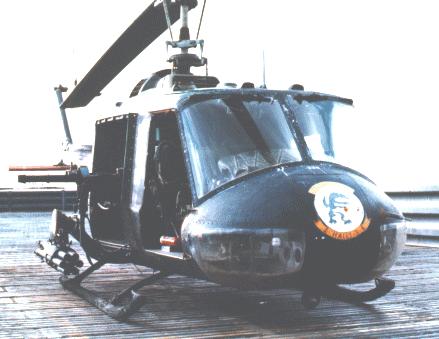
Navy Helicopter Gunship
Knowing that every time we used the PSYOP tape we took fire, we installed smaller
speakers and bigger door guns. The lead helicopter was armed with a 50 caliber machine gun
and dual M60 7.62mm machine guns. The trailing helicopter had a door-mounted M134
6-Barrelled 7.62 minigun that fired up to 4000 rounds per minute and a M60 machine gun. In
addition the helicopters were armed with an external rocket pod (seven 2.75 inch rockets)
for the pilot and an external minigun for the co-pilot.
We then played the tape with the intention of taking fire. The gunners were at the
ready. One gunship flew low and another gunship flew high, ready to roll in for the kill
at the first sign of Viet Cong activity. Apparently, someone in Saigon found out what we
were doing and told us to stop. We did not stop, but used the tape less often. Killing was
our business and the PSYOP tapes helped make business damn good. We never saw the result
of the PSYOP program but heard rumors of enemy forces occasionally defecting.
A Seawolf helicopter pilot who flew a number of PSYOP missions in 1968-69 recalled
playing what he called "The Howling Ghost" tape many times. He said that
"On about half the missions a PSYOP officer would fly with us and attempt to direct
the mission. We dropped leaflets, magazines, and played the tape. Without exception we
drew fire each mission. This was one of the primary objectives of the mission." When
not flying the PSYOP missions, the pilot, "Seawolf 57," flew mostly in support
of the Navy SEALS.
The Wandering Soul tape did not just appear full-blown on the Vietnam scene. There were
earlier variations. One former operations officer of the 10th PSYOP Battalion (1968) told
me:
I do not remember that Wandering Soul reverb tape at all. I note that the time of
that tape follows my tour by 1 year. Our tapes were of Vietnamese funeral music and most
were the standard fare sent to us from Group.
He recorded Robert Brown's "Fire" from 1968 and used the "demonic"
portion repeatedly in an endless loop. He mentioned that the tapes often enraged the Viet
Cong and led directly to their death. "Our C-47 'Gabby' aircraft came back one night
and I waited for them at Binh Thuy for an after-action report. After all, this tape was my
baby and they were beta testing it. The pilot stormed in, spoke briefly with the
Commanding Officer and then came to talk to me. He said that they would never play that
tape again. He had received incredible ground fire the moment they turned it on.
He had stumbled on to a Battalion-sized Viet Cong force and they were bold enough to
attack our aircraft. That's an important intelligence point. It was rare for a Viet Cong
unit to engage our aircraft unless they were absolutely sure of their strength and
security. Of course that was what I wanted. Over the Commanding Officer's objection I
scheduled our C-47 for a repeat visit over the same target. The next night they went up
again, but what I wasn't told until later was that Spooky (a gun ship) went along with our
aircraft and flew the speaker mission in opposing orbit and all blacked out. When our
aircraft played the recording, the ground fire erupted again and Spooky "hosed
em" with all three cannon in full cyclic rpm." This sounds very much like an
early aspect of Project Quick Speak where we tried to get
the enemy to react to our tapes so they could be engaged. He concludes:
This incident happened but was never officially reported. The crew felt damned
good about seeing the ground fire halt instantaneously as Spooky answered back. It was no
fun being an unarmed flying target. As I remember it, no one worried too much that what we
did was against Group regulations.
A former 1st Infantry Division sergeant who served several tours in Vietnam from
1968 to 1970 remembers the taped funeral music. He comments:
The damn reverb effect of the recording is eerie. I saw and picked-up leaflets and
once heard Funeral Music played over the valleys around Landing Zone Mary Ann. A Kit
Carson Scout told me what the music was. This was a ghostly sound. Hell, listening to that
made me want to Chieu Hoi myself. It must have been effective as hell in the jungle at
night.
We have seen no data to verify the success of the Wandering Soul operation. I
suspect it did not do well. The one continuing factor I find is that in most cases the
Viet Cong took fire when they reacted to the tape. This does not seem to be a successful
way to motivate defections.
The Psychological Operations leaflet and poster catalog of the 244th Psychological
Operation Company, Detachment 2, Quang Ngai, Vietnam, offers a leaflet that fits in
very well with this topic. The title is "Two Ways of Appreciating Combatants."
It depicts a live person with the text "One, Human" and a dead person with the
text "One, wicked and Abandoned."
The text compares the life of a Communist soldier with that of a Government of
Viet Nam soldier. It first says of the Communist, " We think of how these wounds
torment your body until the day you die in the nooks and corner of the thick forests and
mountains. In a strange mound, no incense where your bodies are buried. Who will think of
you?..." It next tells of the ARVN soldier, "For us, if we die in the
battlefield our bodies will be carried to our native village and buried there. If we are
wounded, we are taken to a military hospital for medical treatment and recuperation."
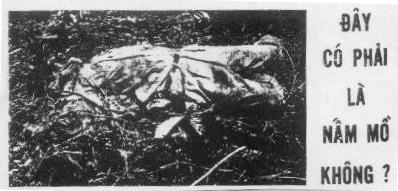
Is this a grave?
Another leaflet asks, "Is this a grave?" Beneath a photo of a dead
NVA soldier. Text on the back is, "Unfortunately, it is not. But it is the final
resting place, many, many kilometers from the graves of his ancestors. His body cannot be
identified, his grave cannot be marked, and his soul will never find rest..."
